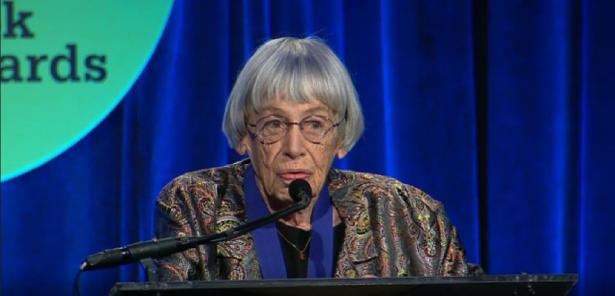In Ursula Le Guin's worlds, a man can have dreams that reshape reality. A village smith's son can become a great wizard. A girl can rescue her little brother from trolls with nothing more than her toy wooden horse.
In Le Guin's worlds, possibility is everything.
"Her worlds are haunting psychological visions molded with firm artistry," the Library Journal once wrote.
Ursula K. Le Guin, a longtime Portland resident who influenced a generation of writers worldwide and whose name became synonymous with superlative speculative fiction, died Monday at her Portland home. She was 88.
A cause of death was not immediately available, but Le Guin had reportedly been ailing for some time. Her son Theo Downes-Le Guin told The New York Times she had been in poor health for several months.
Tributes from fans, including fellow authors, began appearing on social media almost immediately after the news of her death broke.
Portland author Cheryl Strayed wrote on Facebook: "I'll never forget the great Ursula K. Le Guin, who I first met when I was a waitress at the now-closed L'Auberge in Portland in the mid-90s and she was a regular customer. Every time she walked in a hush came over my innermost self. I admired her. I wanted to be like her. ... She was always dazzling, always smart and sharp and astounding. I will miss her presence in this world. Her words will live with us forever.
Portland author Rene Denfeld wrote on Twitter: "Truly one of our greats, a hero, a feminist, a poet, a writer, a beautiful person. A sad day."
Le Guin's work won numerous prestigious awards, including the Newbery Medal, the top honor for American children's literature; multiple Nebula and Hugo science fiction and fantasy awards; the PEN/Malamud Award for excellence in short fiction; and, in 2014, the National Book Foundation's Medal for Distinguished Contribution to American Letters. In 2017, she was inducted into the American Academy of Arts and Letters.
The author Neil Gaiman, a fellow Newbery, Hugo and Nebula recipient, called Le Guin "a giant of literature" in presenting her with the National Book Foundation medal. In a speech during the 2014 ceremony, he recalled discovering Le Guin's classic fantasy series "The Wizard of Earthsea" when he was 11 and becoming "completely hooked." As he grew older, he did more than just read her books and essays - he studied them.
"She made me a better writer," he said. "Much more important, she made me a much better person who wrote."
The speech Le Guin gave at that event sealed her reputation with her fans as she dressed down publishers who succumbed to "a silly panic of ignorance and greed" and prioritized profits over content. "Books aren't just commodities," she said.
Le Guin also took on Google in a bitter, complicated legal fight over its digital scanning of millions of books. She told The Oregonian's then-books editor, Jeff Baker, "the whole principle of copyright is being brushed aside and a corporation is getting to write the rules."
Ursula Kroeber was born Oct. 21, 1929, on St. Ursula's Day, in Berkeley, California, to two anthropologists, Theodora Brown Kroeber and Albert Kroeber. After graduating from Berkeley High School, she studied at Radcliffe College in Boston, then earned a master's degree in Renaissance French and Italian language and literature at Columbia University.
By the time she graduated from Columbia, she'd drafted a novel about an imaginary Central European country she called Orsinia. Her father knew the publisher Alfred Knopf; with her father's approval, she submitted her manuscript to Knopf. He rejected it, but in a way that inspired her.
"Knopf wrote a lovely letter back," she recalled in a 2013 interview. "He said, This is a strange book, but you're going somewhere! That was all I needed. I didn't need acceptance."
She ultimately finished not only a novel but also several short stories and poems about Orsinia, which were collected in the 2016 Library of America anthology "Ursula K. Le Guin: The Complete Orsinia."
In 1953, the aspiring author received a Fulbright Fellowship to study in France; that fall, she left for Europe on the Queen Mary ocean liner. Her fellow passengers included Charles Le Guin, another Fulbright Fellow bound for France. Three months later, they married in Paris.
After stints at Mercer and Emory universities in Georgia and the University of Idaho, the Le Guins settled in 1958 in Portland, where Charles Le Guin had taken a position as a professor of French history at Portland State College, as it was known then. They brought along their baby daughter, Elisabeth; another daughter, Caroline, and a son, Theodore, followed.
Le Guin's influence wasn't limited to literature; she was a cultural force as well. In Portland, she lent her voice and her children's book "A Ride on the Red Mare's Back" in 2010 to the Portland chamber music ensemble Third Angle, whose concerts she frequently attended. With Julie Downing's illustrations from the book projected behind her, Le Guin read the story aloud to the music of Bryan Johanson.
Ron Blessinger, artistic director of Third Angle, said he'd approached Le Guin about narrating because the ensemble had done other pieces treating the voice as an instrument. "I thought her voice in particular was a magnificent musical instrument and would make a complete musical composition," he said.
"I've read her science fiction, dealing with a complex mind that tells brilliant stories that are complicated," he said. "And then to hear her read this children's story was just genuinely moving and profound."
"She was a magnificent person in the large sense and in the intimate personal sense, on all possible levels. She operated beautifully and was a lovely, lovely person and will be missed greatly."


Spread the word